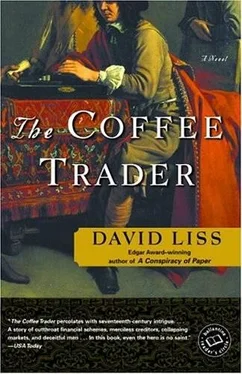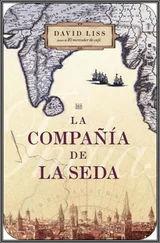He would wait. Joachim surely never meant to actually kill Miguel, but should he again make these threats, he would learn that Miguel understood justice as well as mercy.
Before he reached the Vlooyenburg, the mist had turned to rain.
Miguel wanted nothing so much as to change his clothes and sit before a fire, and perhaps read a little Torah-all this contemplation of mercy left him longing to feel closer to the holiness of the Most High. First he might review the story of how Charming Pieter had tricked the greedy horse trader, a tale always certain to cheer him.
Once inside, he removed his shoes, after the Dutch fashion, so as to avoid tracking mud through the house, though his stockings had soaked through, and he left wet footprints upon the tiled floor. He had only gone a little way toward the entrance to the cellar when he saw Hannah hovering in the doorway, the shadows accentuating the swelling of her belly.
“Good afternoon, senhora,” he said, too hastily. There could no longer be any doubt of her intentions. Her eyes, wide and moist under her black scarf, fixed on him greedily.
“I must speak with you,” she said, in a quiet voice.
He replied without thinking. “You wish another taste of my drink?”
She shook her head. “Not now. I must say something else.”
“May we go to the drawing room?” he asked.
She shook her head again. “No, we mustn’t. I can’t have my husband finding us there together. He will suspect.”
He will suspect what? Miguel almost blurted out. Did she believe them already lovers? Had she so lively an imagination that it did not end with women scholars? Miguel too had indulged in the delicious crime of flirtation, but he did not believe he could take it to the next stage, that of secret meetings, of hiding from her husband, of reveling in one of the worst of sins. No one cherished the delights of a fanciful mind more than Miguel, but a man-a person-must know where fancy ends and truth begins. He might hold Hannah in a new esteem, find her winsome as well as pretty. He might even love her for all he knew, but he would not act on those feelings.
“We must speak here,” she said, “but quietly. We cannot be overheard.”
“Perhaps you’ve made a mistake,” Miguel offered, “and we needn’t speak quietly at all.”
Hannah offered a smile, slight and sweet, as though she were humoring him, as though he were too simple to understand her words. May the Holy One, blessed be He, forgive me for unleashing coffee upon mankind, he thought. This drink will turn the world upside down.
“I am not mistaken, senhor. I have something to tell you. Something that concerns you very nearly.” She took a deep breath. “It is about your friend, senhor. The widow.”
Miguel felt a sudden dizziness. He leaned against the wall. “Geertruid Damhuis,” he breathed. “What of her? What could you have to tell me of her ?”
Hannah shook her head. “I don’t know precisely. Oh, forgive me, senhor, for I hardly even know how to say what I wish to say, and I fear to do so will put my very life in your hands, but I also fear your betrayal if I do not speak.”
“Betrayal? What do you say?”
“Please, senhor. I am trying. Not very long ago, only a few weeks really, I saw the Dutch widow on the street, and she saw me. We both had something to hide. I don’t know what she had to hide, but she seemed to think I did, and she threatened me to keep silent. I thought it could do no harm, but now I am not so certain.”
Miguel took a step backwards. Geertruid. What could she have to hide, and what did it mean to him? It could be anything: a lover, a deal, an embarrassment. Or it could be a matter of business. It made no sense. “What did you have to hide, senhora?”
She shook her head. “I wish I didn’t have to tell you, but I have made up my mind to do so. I know I can trust you, senhor, and if you must confront her, and you make it clear you already know my secret, perhaps she won’t tell others, and the worst may be spared. Can I tell you and trust that you will tell no one else?”
“Of course,” Miguel said hastily, though he wished desperately that he could somehow avoid this entire conversation.
“I am ashamed,” she said, “and yet not ashamed to tell you this, but I saw the widow on my way from a sacred place. A church of Catholic worship, senhor.”
Miguel stared at her with unfocused eyes until she blended into the dark wall. He hardly knew what to think. His own brother’s wife, a woman for whom he had cared and felt desire, had revealed herself a secret Catholic.
“You have betrayed your husband?” he asked quietly.
She swallowed hard. The tears had not yet come, but they would come soon. They filled the air like a coming rain. “How can you speak of betrayal? I was never told until the eve of my wedding that I was a Jew. Have I not been betrayed?”
“You betrayed?” Miguel demanded, once again forgetting to keep his voice quiet. “How can you say so? You live in the new Jerusalem.”
“Have you or your brother or the rabbis spoken to me of what is in your Torah or Talmud other than to tell me what I must do to serve you? When I go to your synagogue, the prayers are in Hebrew and the talk is in Spanish, yet I may not learn these tongues. If I have a daughter, must I raise her to serve an arbitrary God who will not even show His face only because she is a girl? It is well for you to talk of betrayal when the world hands you all you desire. I am offered nothing, and if I wish to take for myself some comfort, am I to be condemned?”
“Yes,” Miguel said, though he did not believe it and instantly regretted having said so. But he was angry. He could not have said why, but he felt wounded, as though she had violated some trust between them.
He had not seen the tears start, but there they were, glistening upon her face. He fought the urge to pull her to his body, to feel her breasts against his chest, but he couldn’t, so instead he pressed on. “I have nothing more to say to you. Now leave me so I may think on what to do with this knowledge that I wish I had never heard.”
The cruelty of his words stuck in his throat; he knew what they would mean to her. She would wonder if Miguel might keep quiet. He now knew his brother’s wife was a papist, and that information could destroy Daniel. Miguel might reveal this information to usurp his brother’s place in the community, or he could use it to threaten Daniel into forgiving his debts.
Miguel would do none of these things. No matter how repulsive her sin, he would not betray Hannah. Even so, he felt such sudden rage that he had to punish her, and his words were the only way he knew how.
“I heard voices. Is something wrong?”
Daniel appeared at the doorway of the kitchen, looking pale. His little eyes focused on his wife, standing far too close to a retreating Miguel.
“It is only your silly brother,” Hannah said, hiding her face in the poor light. “I saw him come in wearing these wet clothes, but he refuses to change out of them.”
“It is not for a woman to decide if a man is silly,” Daniel pointed out, not unkindly. He merely illuminated information she may have forgotten. “Nevertheless,” he said to Miguel, “she may be right. I won’t have you catch plague and kill us all.”
“The entire household has an opinion on my clothes.” Miguel affected as best he could an easy manner. “I’ll go change at once before the maid is summoned to speak her piece.”
Hannah took a hurried step back, and Miguel turned instinctively toward the stairwell. Daniel had seen nothing; Miguel could be almost certain of that. What, after all, had there been for him to see? Yet he must know the full vocabulary of his wife’s expressions, and surely he had seen one upon her face that could not be a simple matter of housewifely advice.
Читать дальше












